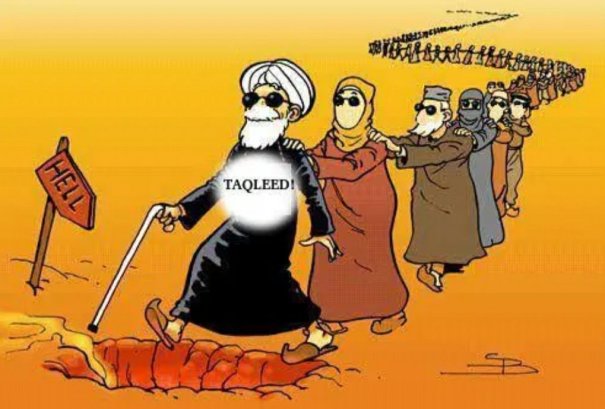Assalamu alaikum wa rahmatullahi wa barakatuhu.
May peace and blessings of Allah SWT be on all of you.
Many of us may not be knowing about Blind Following and its relation with Islam. So here I am with this interesting topic , that co-relates to our existing times and lets us make our lives easy , peaceful and helpful to others , in sha Allah.
Blind Following existed in all times. In fact , Islam came to eradicate Blind Following. Every Prophet was sent to guide people onto the right path and to eliminate Blind Following.
 Blind Following is called TAQLEED in Arabic. Taqleed , in Islamic view means , to blindly follow any of the four Imaams and their school of thoughts known as Madhabs. To elaborate , it means blindly or rigidly following an Imaam even after getting an authentic narration or hadith that opposes the teachings or statements of that particular Imaam. Whereas , the Imaams , weather it is , Imaam Abu Haneefa or Imaam Maalik or Imaam Ash-Shaafai or Imaam Hambal , all the Imaams have told that , if you get more authentic narration or an authentic hadith then that is my opinion.
Blind Following is called TAQLEED in Arabic. Taqleed , in Islamic view means , to blindly follow any of the four Imaams and their school of thoughts known as Madhabs. To elaborate , it means blindly or rigidly following an Imaam even after getting an authentic narration or hadith that opposes the teachings or statements of that particular Imaam. Whereas , the Imaams , weather it is , Imaam Abu Haneefa or Imaam Maalik or Imaam Ash-Shaafai or Imaam Hambal , all the Imaams have told that , if you get more authentic narration or an authentic hadith then that is my opinion.
For example : Imaam Abu Haneefa said , ‘ This is my opinion , but if there comes someone whose opinion is better than mine , then accept that. ‘
Imaam Maalik said , ‘ I am only a human , I may be right or I may be wrong , so measure my words by the Quran and Sunnah. ‘
It was their advice that the students of knowledge , obtaining Islamic knowledge , should acquire it from where they acquired it , that is , the primary source , the Quran and Sunnah. Shaikh Ibn Taymiyyah said ‘ no one has to blindly follow any particular man in all that he enjoins or forbids or recommends , apart from the Prophet Muhammad (peace be upon him). ‘

After the era of Prophet Muhammad (peace be upon him) and the companions (sahabas) , again , Blind Following (taqleed) started to make its comeback in the society. This was the time when Fiqh was evolving. The Evolution of Fiqh took place in Six stages.
#Revelation stage ( i.e , Prophet’s time )
#Establishment stage
#Building stage
#Development stage
#Consolidation stage &
#Stagnation or Decline stage.
Taqleed was the prevailing characteristic of the sixth stage of Evolution of Fiqh , that is , Stagnation or Decline. This was the period of rise of the Ottoman Empire (1258-19th C). This was the era where following any of the four Imaams was compulsory. Any one Imaam had to be followed , people could not shift from one Madhab to another , this was considered a crime and they would be jailed for this act of ‘crime’. During this time the door of Ijtihad(reasoned ruling) was closed , there was no more Ijtihad as scholars feared forgery in Islam. Hence , Taqleed was “Rule Of The Day!”.
During this time the scholars of Islam like Ibn Taymiyyah , Ash Shauqanni opposed Taqleed and fought against it. Imaam Ash-Shauqanni even declared Taqleed Haram and wrote a book on it called ‘ Beneficial Ruling On Blind Following ‘ . The Imaams had also discouraged Taqleed during their time , by not letting their students write their teachings like , Abu Haneefa. He had even explained the reason by saying ” I may say it today and reject it tomorrow….” Because of the care the Imaams took in warning their students of blind following , those early scholars never hesitated in rejecting what the Imaams taught , when new hadiths were made available. For example , Abu Yusuf and Muhammad Hassan differed from their teacher , Abu Haneefa , in about one third rulings of their Madhabs . Similarly , Al-Muzani and others differed in many rulings from their teacher , Ash-Shafaai.

Therefore , to conclude , we come to know five main things from these evidences . Firstly , that all the Imaams and the scholars discouraged blind following . Secondly , that we are allowed to blindly follow only Prophet Muhammad (peace be upon him) as he was infallible. Thirdly , others after him are bound to errors. Fourth , that if one has to know of any ruling or anything to that matter , relating to Islam , he should go back to the sources and find out. And Lastly , the main thing that throws light upon here is not to blindly follow any Imaam and that if truth comes to you , the teachings of Imaam should not be considered.
NOTE:- Hadith is given precedence over the opinions of Imaams. But following Imaams and scholars is important as Islam came to us through them. Common people should follow whatever knowledge is available to them and keep their minds open and rely on open-minded scholars as much as possible.
And Allah Knows Best.
Assalamu alaikum wa rahmatullahi wa barakatuhu.

